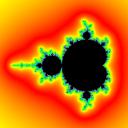Le 4 mai 2021, la plateforme Yahoo Questions/Réponses fermera. Elle est désormais accessible en mode lecture seule. Aucune modification ne sera apportée aux autres sites ou services Yahoo, ni à votre compte Yahoo. Vous trouverez plus d’informations sur l'arrêt de Yahoo Questions/Réponses et sur le téléchargement de vos données sur cette page d'aide.
Card hand probability?
Ms X and 3 other players are dealt 5 cards each from a standard pack.
We know that Ms X has got exactly 1 ace.
What is the probability that none of the 3 others have got more aces than Ms X ?
@Michael, ÷/0, Nick: I believe that none of your answers are correct. Do note that Ms X has *exactly* 1 ace, and that each person has been dealt 5 cards
Divide By Zero: Your answer is near, but not quite correct, which you may spot if you go over it with a toothcomb.
Divide By Zero, in your revised expression, shouldn't you apply "Sauce for the goose is sauce for the gander" ?
2 réponses
- Divide By ZeroLv 7il y a 7 ansRéponse favorite
Edit #3 -- M3, I'm pretty confident in my answer, since I used one straight-forward method and one brutish method which both agree. I would probably be willing to place a wager on my answer, since I am a gambling man ;)
My first method works because only one person can get >1 ace. That's why it doesn't over-count anything when I multiply by the 3 players, so there's no need to worry about overlap or inclusion-exclusion. My 2nd method works because it explicitly counts all combos and partitions of the 15 cards dealt to the opponents (though I omitted the C(9,4) in the numerator and denominator since they cancel).
Edit #4 -- Aha, good thing you are kind and didn't accept the wager.
There are not 51 cards left in the deck, there are 47, since as you reiterated, Ms X has exactly 1 ace meaning her other cards are known. What threw me is that they're not known specifically. But they are known to be non-aces, so that still subtracts from the deck for our purposes here.
1 - 3*[C(3,2)*C(44,3) + C(44,2)] / C(47,5) = 995/1081 = 92.0444%
And my 2nd method becomes:
Pr(someone has 2 aces) =
C(3,2) * C(44,13) * C(13,3) + .
C(44,12) * C(3,2) * C(12,3)
/ C(47,15) / C(14,4)
Pr(someone has 3 aces) = C(44,12) * C(12,2) / C(47,15) / C(14,4)
** EDIT #5 final bleeping edit I hope! **
Yes changed the 48's to 44's int he 2nd method but forgot to in the 1st. Fixed. It took me a minute to know what the heck you were talking about with sauce and geese lol. What's good for the denominator is good for the numerator indeed.
- MichaelLv 7il y a 7 ans
Well,
this is what i propose :
let be X1, X2, X3, X4 the random variables representing the number of aces in the hands of players N0 1, 2, 3, 4
Mr X is called player 1, he has X1 = 1 ace in hand : P(X1 = 1) = 1
let's compute the complementary event E2 : one player hes more aces than player 1 :
we can notice that, as there are 4 aces, only 1 among the 3 can have more aces:
(E2 | X1 = 1) = ...
= (X2 = 2 | X1 = 1) υ (X3 = 2 | X1 = 1) υ (X4 = 2 | X1 = 1) υ (X2 = 3 | X1 = 1) υ (X3 = 3 | X1 = 1) υ (X4 = 3 | X1 = 1)
the events are "exclusive" (french vocabulary : A ∩ B = ∅ ==> P(A υ B) = P(A) + P(B) )
and :
P(X2 = 2 | X1 = 1) = P(X3 = 2 | X1 = 1) = P(X4 = 2 | X1 = 1)
and :
P(X2 = 3 | X1 = 1) = P(X3 = 3 | X1 = 1) = P(X4 = 3 | X1 = 1)
then for every ace:
P(X2 = 2 | X1 = 1) = 4*P(X2 = 2 | X1 = ace of heart)
with : in the hand of X2 : 2 aces among 3 times 2 "any" cards among 52 - 4 aces = 48
possibilities on 5 cards among 52 - 1 ace (in player_1's hand) = 51
P(X2 = 2 | X1 = ace of heart) = 3C2 * 48C3 / 51C5 and 51C5 = 51*50*49*48*47/(5*24)=51*10*49*47
= 3 * 48 * 47 * 46 /3 / (51*49*47*10)
# 0,088355342...
so : times 4, so to cover all cases
==> P(X2 = 2 | X1 = 1) # 0,35342
same procedure for :
P(X2 = 3 | X1 = 1) = 4*P(X2 = 3 | X1 = ace of heart)
P(X2 = 3 | X1 = ace of heart) = 3C3 * 48C2 / 51C5
= 1 * 48 * 47 /2 / (51*49*47*10)
# 0000960384
==> P(X2 = 3 | X1 = 1) = 0,003841537
# 0,3573
therefore :
P(X2 has more aces | X1 = 1) # 0,35342 + 0,003841537
# 0,3573
and finally :
P(no player has two aces or more | X1 = 1) # 0,6427 = 64.27%
hope it' ll help !!



